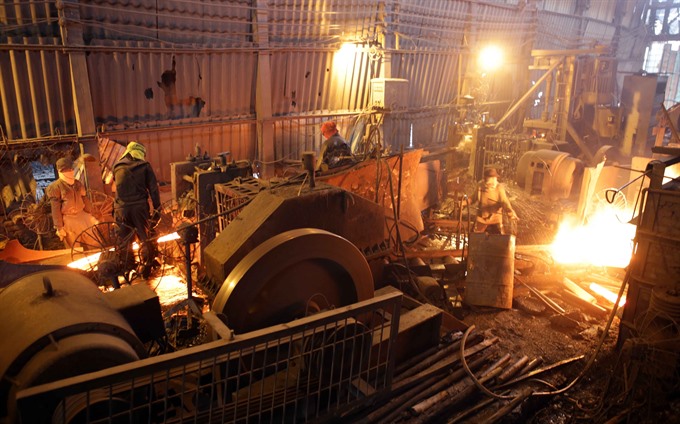Local businesses should follow laws and requirements on origin when exporting their product to the US.

Local steel makers should follow laws and requirements on origin when exporting their products to the US.
That’s the message from Ho Nghia Dung, chairman of Viet Nam Steel Association (VSA) after the US Department of Commerce (DoC) decided to levy import tax on steel produced in Viet Nam using Chinese-origin substrate.
The US Customs and Border Protection (CBP) will continue to collect anti-dumping (AD) and countervailing duty (CVD) cash deposits on imports of corrosion-resistant steel (CORE) produced in Viet Nam using Chinese-origin substrate at the rate of 199.43 per cent and 39.05 per cent, respectively.
CBP will also collect AD and CVD cash deposits on imports of cold-rolled steel produced in Viet Nam using Chinese-origin substrate at the rate of 199.76 per cent and 256.44 per cent, respectively. Dung said the Viet Nam’s steel exports to the US would be sharply reduced with the decision.
Statistics showed that the Viet Nam’s steel exports to the US were reduced from more than 900,000 tonnes in 2016 to 500,000 tonnes in 2017.
After the DoC’s decision, VSA’s members have been quick to seek material for steel production from other countries or local ones instead of importing from China.
He said a big amount of hot rolled steel – the material for colour coated steel and galvanised steel production - was provided into the market after Formosa came into operation.
The amount of imported steel from China in the first quarter of the year was 1.1 million tonnes, half as much from the same period last year and a 29 per cent decrease in term of value.
The US, however, is still the third largest steel importer of Viet Nam despite of the tax levy. In the first three months of the year, the amount of steel exports to the US reached 217,000 tonnes, accounting for 15 per cent of Viet Nam’s total steel exports.
The chairman said the country’s steel sector has seen strong growth of construction steel and flat steel. Viet Nam has been able to produce construction steel products, from ore, steel scrap to hot rolled steel. Previously, Viet Nam had to import hot rolled steel from foreign countries including China, South Korea and Japan.
VSA said they co-operated with ministries, sector and businesses to clarify two issues relating to DoC’s investigation on steel produced in Viet Nam using Chinese-origin substrate.
They would clarify that not all Vietnamese steel originates from China. In addition, Viet Nam has been investing in large and modern scales of final production stages to produce galvanised and cold rolled steel.
The latest information from the Vietnamese Ministry of Industry and Trade (MoIT) revealed that the DoC would remove the tax levy on Vietnamese steel exporters if they prove that their products were not used material from China.
The ministry would continue to co-operate with relevant steel producers to resolve the requirements from the DoC.
Chu Thang Trung, deputy director of the ministry’s Department of Trade Defence, said they suggested producers study and meet conditions from the DoC to be exempted from the tax levy.
The ministry has closely co-operated with VSA and businesses to follow the case from the initiating of the investigation in June 2016.
MoIT asked the DoC to implement investigations objectively and in line with WTO’s regulations as well as the US’s norms. They also asked the DoC not to impose the tax on Vietnamese steel exporters.
VSA and Vietnamese steel producers have also closely co-operated with the US to clarify the material origin for steel production in Viet Nam. — VNS





